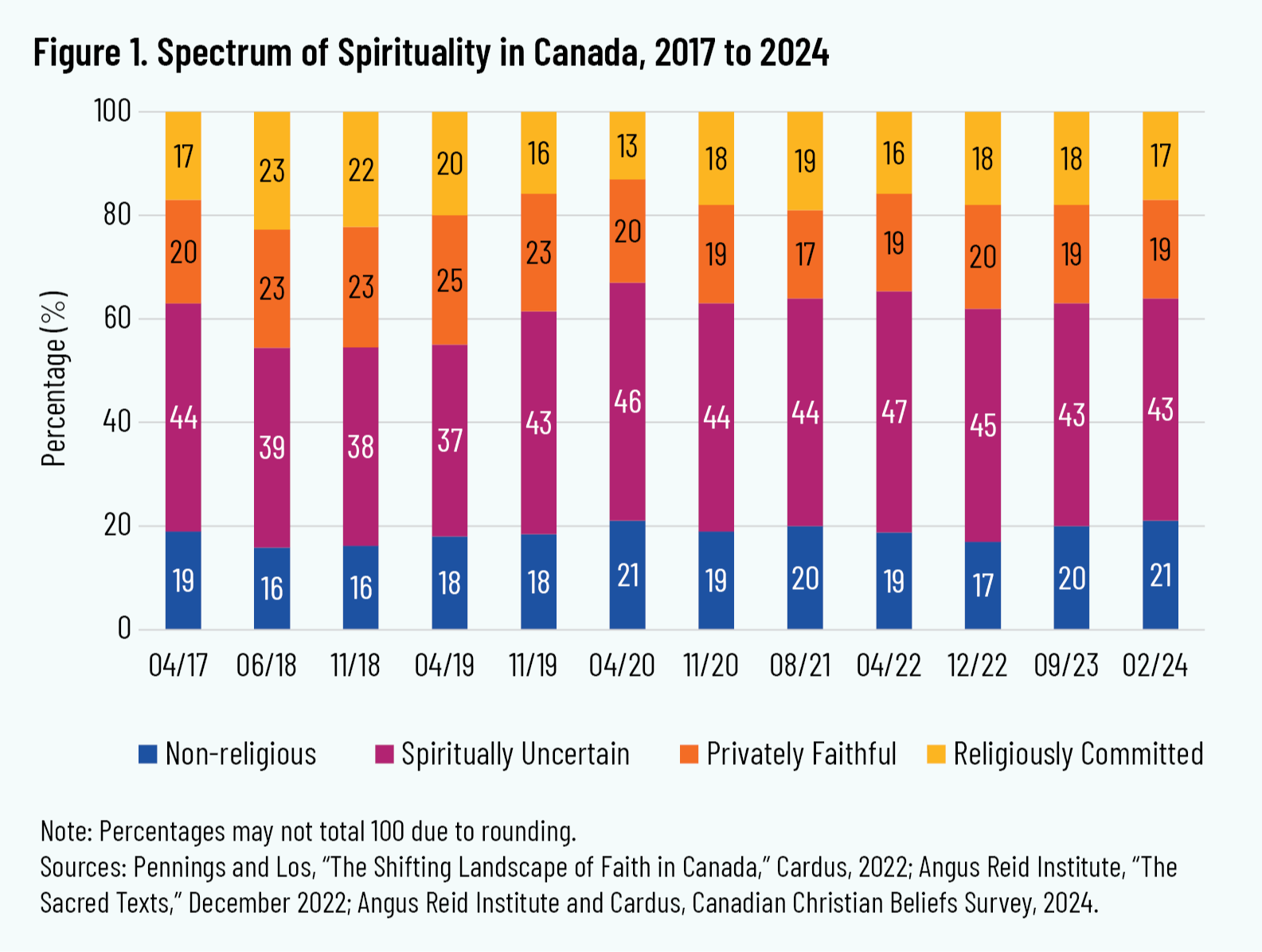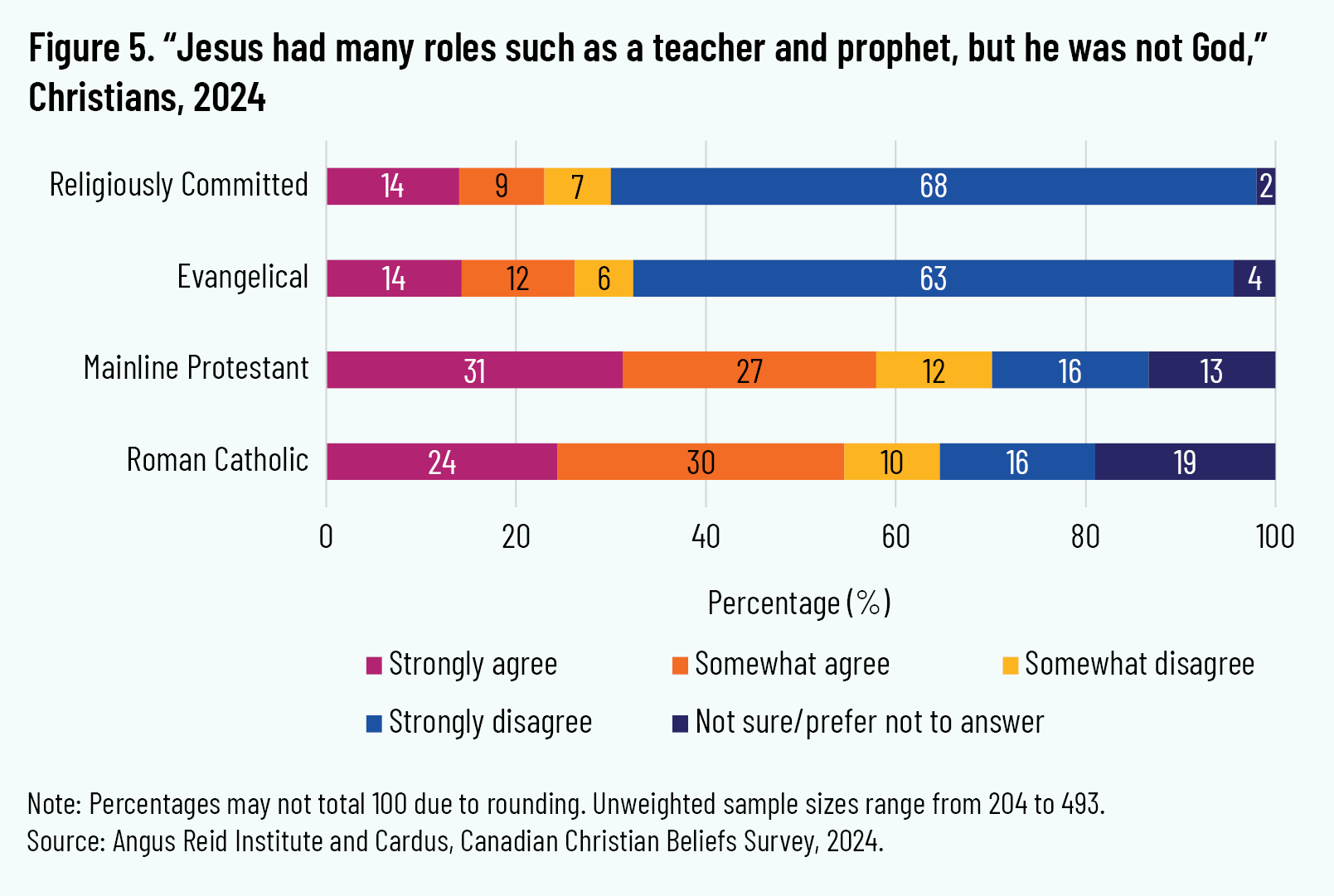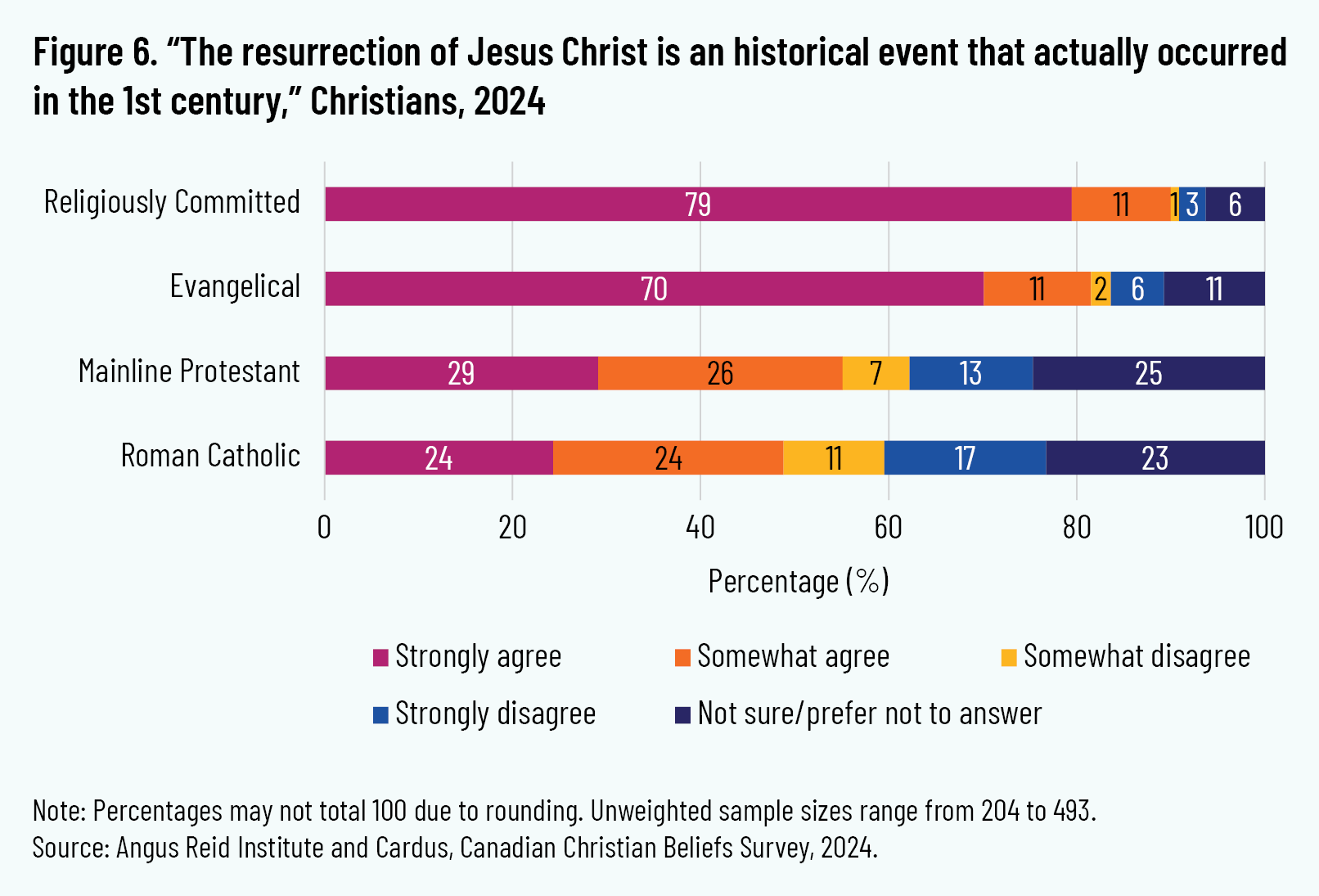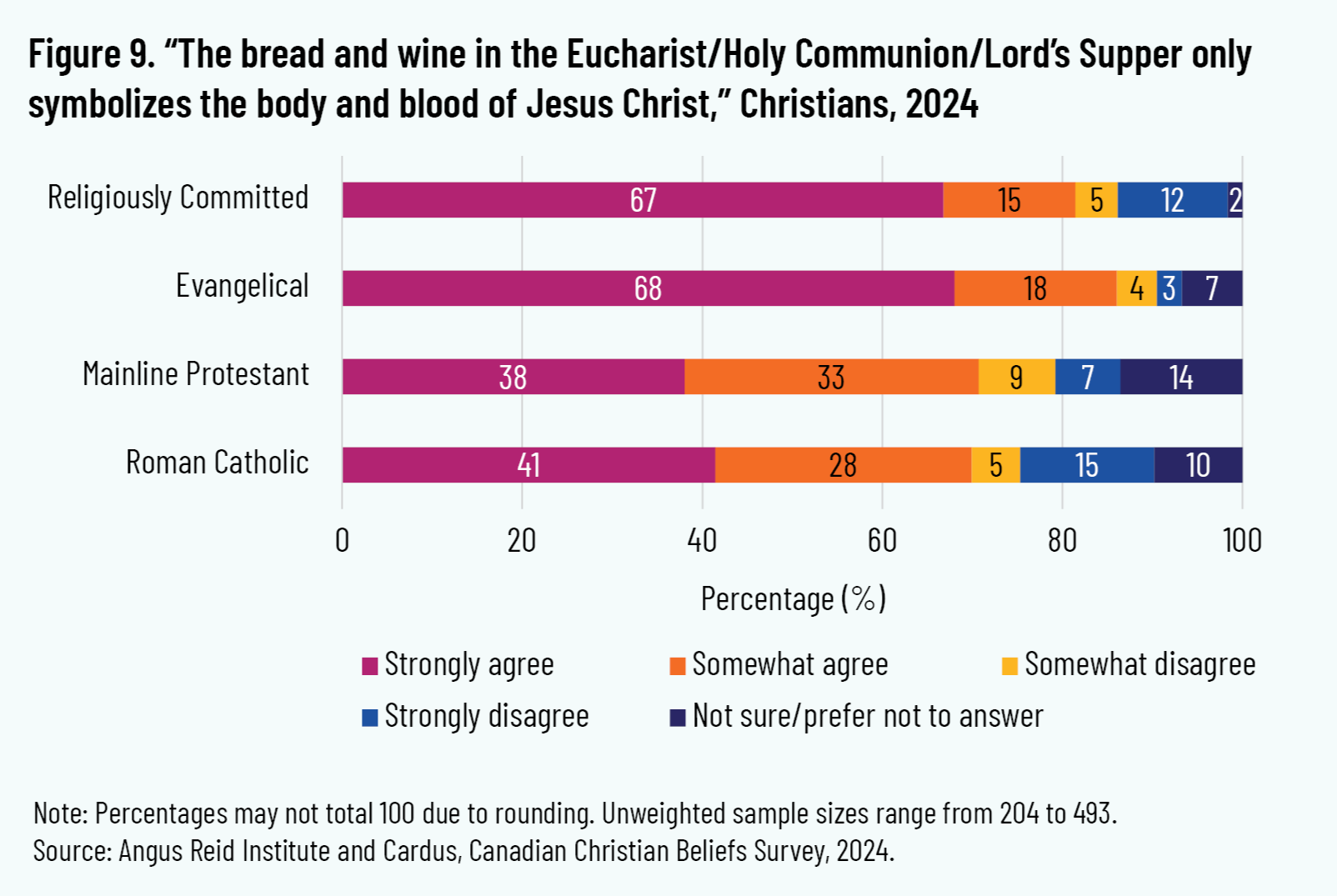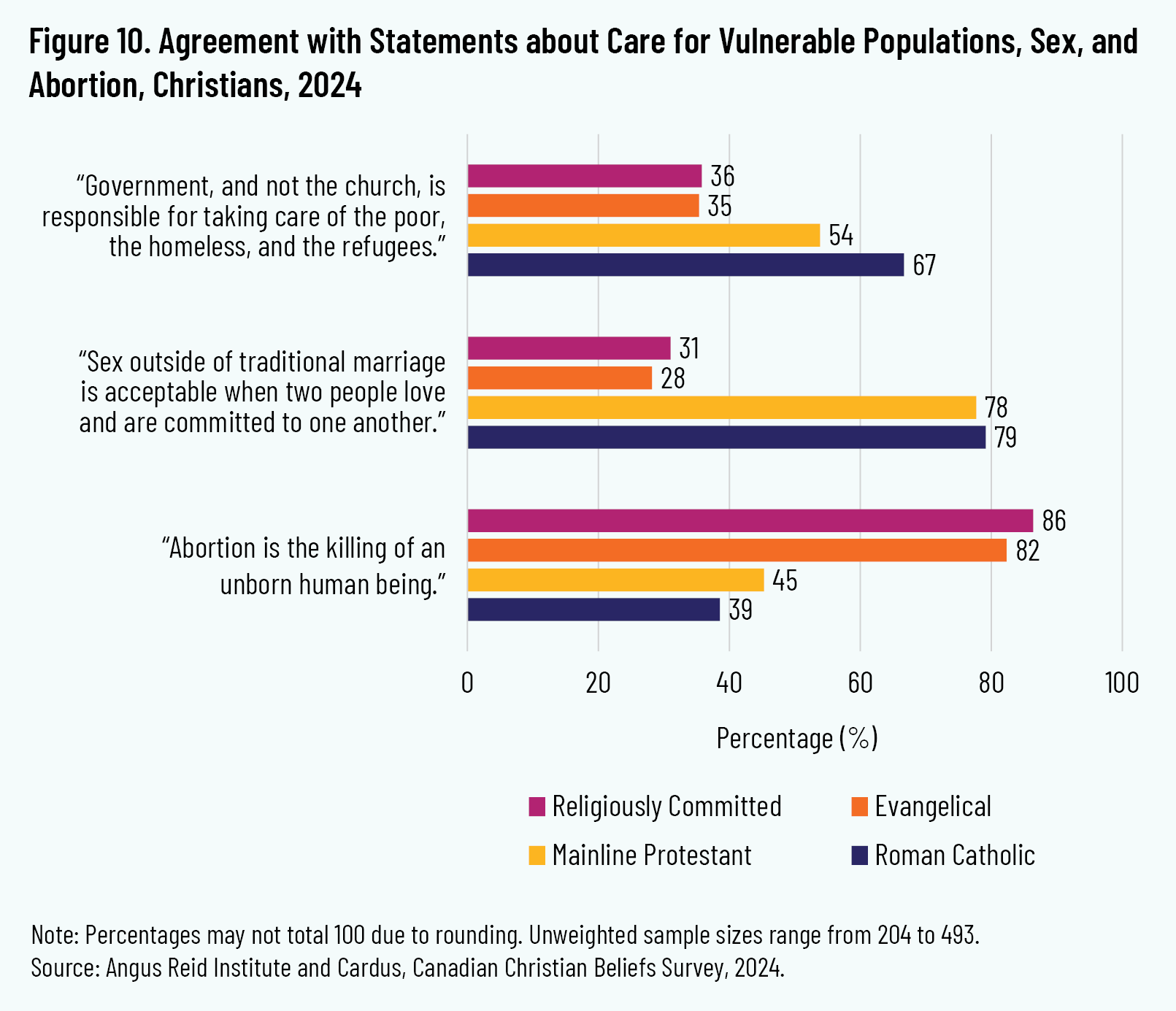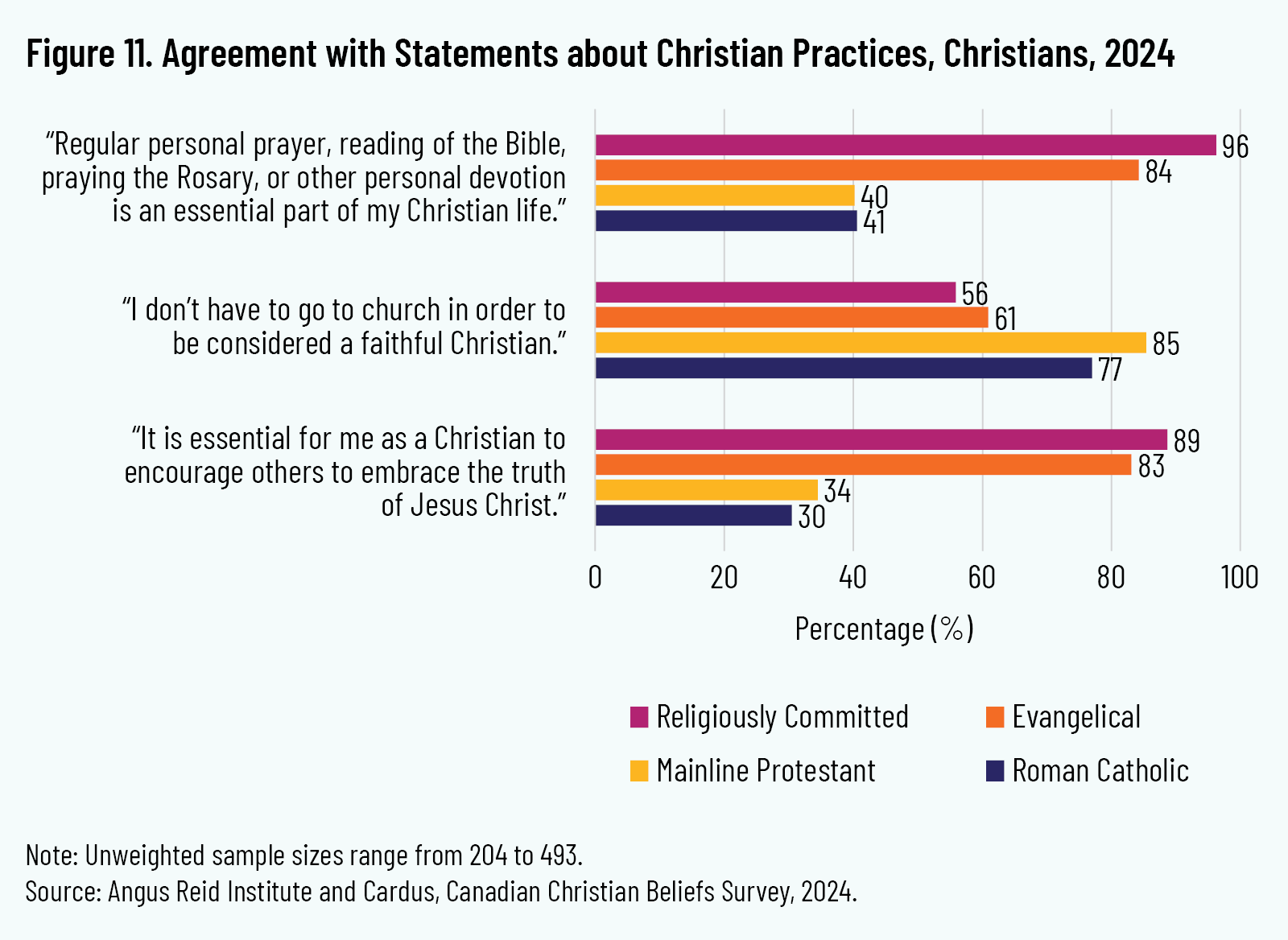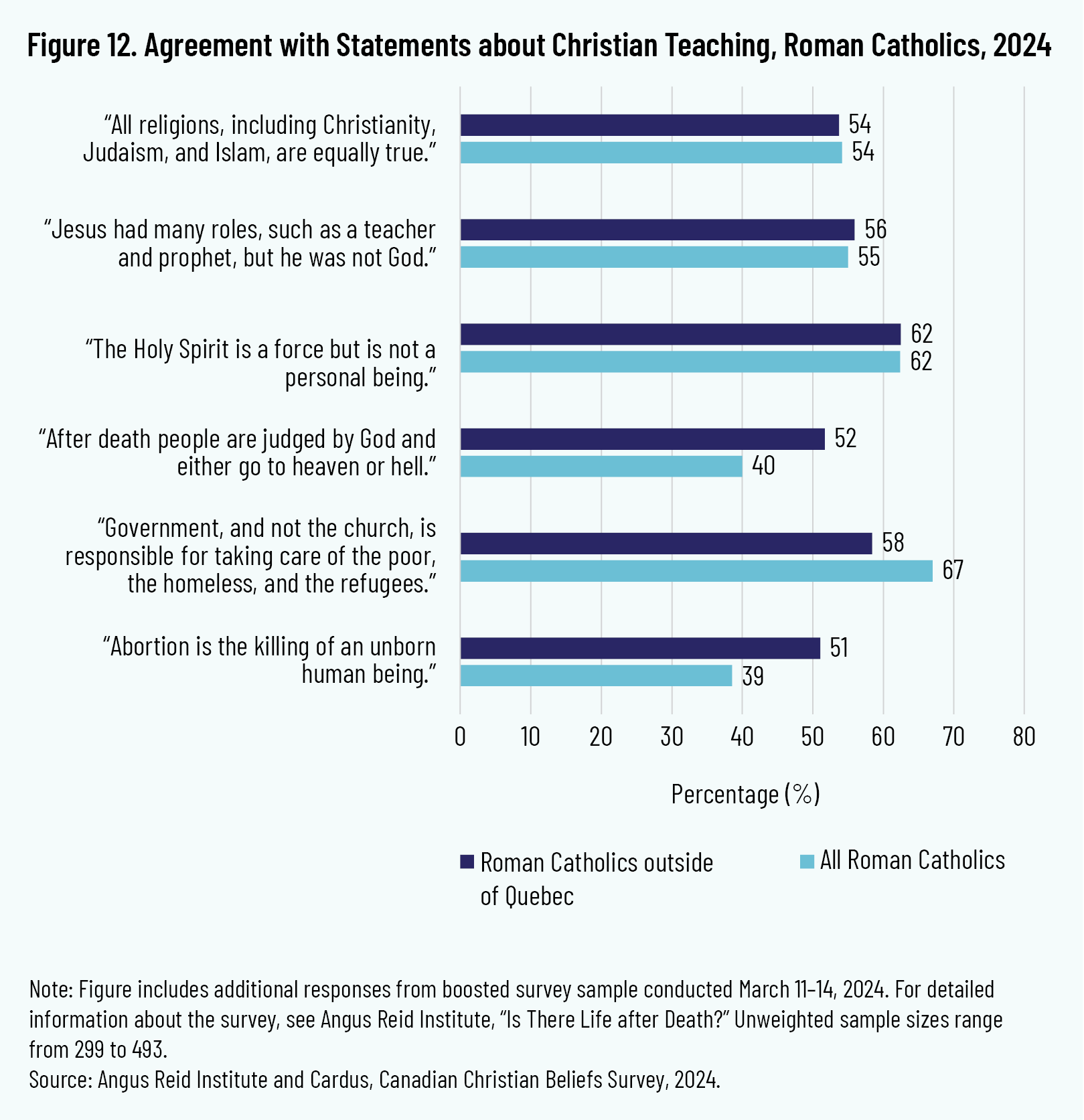Key Points
- Cardus, in collaboration with the Angus Reid Institute, conducted a survey in February 2024 to find out what Canadians who identify as Evangelical, Catholic, and mainline Protestant believe.
- “Religiously Committed” Christians do not necessarily adhere to core Christian beliefs or teachings.
- Younger Christians appear to be more intentional or committed to the teachings and practices of the faith than Christians of their parents’ or grandparents’ generations.
- Regardless of which branch of the faith Christians identify with, there is some degree of incoherence between what Christians personally believe and what their church teaches.
- When asked whether “There is one true God in three persons: Father, Son, and Holy Spirit,” 89 percent of Evangelicals agreed, 51 percent of Catholics agreed, and 57 percent of mainline Protestants agreed.
- When asked whether all religions are equally true, 20 percent of Evangelicals agreed, compared to 54 percent of Catholics and 57 percent of mainline Protestants.
- Belief in the resurrection of Jesus Christ as an historical event is held by 81 percent of Evangelicals, 48 percent of Catholics, and 55 percent of mainline Protestants.
- Sixty-five percent of Evangelicals disagreed that “Christian moral teachings should evolve with changes in society’s attitudes,” whereas 72 percent of Catholics and 61 percent of mainline Protestants agreed.
- Sixty percent of Evangelicals disagreed that “government, and not the church, is responsible for taking care of the poor, the homeless, and the refugees,” while 67 percent of Catholics and 54 percent of mainline Protestants agreed.
Introduction
What do Canadian Christians believe about their faith? Little published research is available on the beliefs that Canadian Christians hold, their views on Christian practices and moral teachings, and how they live out their faith publicly. To explore these questions, in February 2024 Cardus conducted a survey in partnership with the Angus Reid Institute and with support from the Canadian Bible Society. 1 1 For related studies, see A. Bennett, “The Bible and Us: Canadians and Their Relationship with Scripture,” Cardus, 2023, https://www.cardus.ca/research/faith-communities/reports/the-bible-and-us-canadians-and-their-relationship-with-scripture/; Angus Reid Institute, “The Sacred Texts: Canadian Perspectives on the Bible, Qu’ran, Torah, and Their Place in Modern Society,” December 2022, https://angusreid.org/canada-religion-sacred-texts-bible-quran-torah; and R. Pennings and J. Los, “The Shifting Landscape of Faith in Canada,” Cardus, 2022, https://www.cardus.ca/research/faith-communities/reports/the-shifting-landscape-of-faith-in-canada/. This study drew inspiration from similar studies undertaken in the United States, notably Ligonier Ministries and LifeWay Research’s “State of Theology” survey and the Pew Research Center’s “U.S. Religious Knowledge Survey.” 2 2 Ligonier Ministries and LifeWay Research, “The State of Theology,” https://thestateoftheology.com/; Pew Research Center, “What Americans Know about Religion,” https://www.pewresearch.org/religion/2019/07/23/what-americans-know-about-religion/.
The present survey has two parts. The questions asked in the first part enabled each respondent to be placed into one of the four positions on the Spectrum of Spirituality, which is a measure of religiosity developed in previous research by Cardus and the Angus Reid Institute (see more on the Spectrum, below). The second set of questions enabled respondents’ beliefs to be compared and contrasted with beliefs that have historically been affirmed within Christianity and that continue to be officially endorsed by some Christian churches.
The title of this report, “Still Christian(?),” is meant to be taken in two ways. On the one hand, this study reveals that many Canadians who identify as Christian do not hold the beliefs that Christians have historically affirmed or that their particular church continues to affirm. For this reason, the title contains a question mark: Is it accurate to say that these Canadians are still Christian, even if their beliefs are at odds with what their church tradition teaches? On the other hand, this study reveals that despite the incoherence or disharmony between what these respondents believe and what their church tradition teaches, they consider themselves connected to the faith, and in this sense they are “still Christian.” When asked in the survey, “Which of the following best describes your religion,” they selected a Christian option from the set of options presented, rather than selecting some other religion or “No religious identity.” This fact is significant in itself.
Methodology
The Sample
The Angus Reid Institute conducted an online survey from February 20 to 25, 2024 of a representative, randomized sample of 2,026 Canadian adults who are members of the Angus Reid Forum. The survey samples are weighted to the latest available Statistics Canada census data, except for regional sample sizes, which are unweighted. 3 3 For a more thorough breakdown of weighting and general population sample sizes, see Angus Reid Institute, “Is There Life after Death? Majority of Canadians Believe They May Have More Than One Life to Live,” March 2024, https://angusreid.org/do-canadians-believe-life-after-death-afterlife-reincarnation/. Throughout this report, percentages may not total 100 due to rounding.
In order to obtain more respondents who were Christians, under age 40, and attend religious services at least weekly, additional members of the Angus Reid Forum were recruited until there were 147 additional respondents that met these criteria.
The sample yielded for study 1,035 respondents (51 percent) who identified as Christian. Of these, 48 percent (493) identified as Roman Catholic, 26 percent (266) as mainline Protestant, and 20 percent (204) as Evangelical. Very small percentages of Christian respondents identified as something other than one of these three groups, and this report omits these respondents when breaking out the results by these three groups.
The responses of the 1,035 respondents, which include the 147 respondents, all of whom identified as Christian, are the subject of this report. The survey instrument is provided as an appendix.
The response options for the breakdown of Christian denominations or traditions are the ones that Statistics Canada uses and are consistent with previous Cardus polling. If a respondent selected “mainline Protestant” or “Evangelical,” they were presented with a second set of options and asked to select the one that best represented their denomination or tradition. This second list included denominations that researchers typically categorize as mainline Protestant or as Evangelical. 4 4 Note that unlike “The Bible and Us” study, in this study Latter-day Saints and Jehovah’s Witnesses are not included in the data that is broken down by Catholic, mainline Protestant, and Evangelical, and Spectrum of Spirituality groups. This second step was used because some members of churches that researchers usually type as mainline Protestant may identify as Evangelical, and vice versa. For example, some Anglicans consider themselves Evangelical, although researchers usually type Anglican as mainline Protestant. This second step enables the researchers to learn more about these self-identifications, but in this report, respondents are grouped by their first-round responses. For example, a respondent who chose “mainline Protestant” in the first round and “Anglican” in the second was placed in the mainline Protestant group. A respondent who selected “Evangelical” in the first round and “Anglican” in the second was placed in the Evangelical group.
The Spectrum of Spirituality
The survey’s first part posed a set of questions that make up the Spectrum of Spirituality Index, developed by Cardus and the Angus Reid Institute in order to provide greater nuance about Canadians’ religious identities and their spiritual lives. 5 5 See Angus Reid Institute, “A Spectrum of Spirituality: Canadians Keep the Faith to Varying Degrees, But Few Reject It Entirely,” April 13, 2017, https://angusreid.org/religion-in-canada-150/; Pennings and Los, “The Shifting Landscape of Faith in Canada,” 22–23.
Consider two hypothetical Canadians who select “Protestant” when responding to a survey question asking them what their religion is. One respondent selects Protestant because they were baptized in a church but otherwise have no involvement with the faith. The other respondent selects Protestant because they follow their church’s teachings and practices on a weekly basis. The Spectrum of Spirituality seeks to reveal these types of distinctions within Canadians’ religious self-understanding and to explore the role that spirituality and religious beliefs and practices play in Canadians’ lives.
The Spectrum of Spirituality asks these questions about the person’s beliefs and practices:
- whether they believe in God or a higher power;
- whether they believe in life after death;
- how important they think it is for a parent to teach their children about religious beliefs;
- how often, if at all, the person feels they experience God’s presence;
- how often, if at all, the person prays to God or a higher power;
- how often, if at all, the person reads the Bible, Qu’ran, or other sacred text; and
- how often, if at all, the person attends religious services (other than weddings or funerals). 6 6 To respondents who indicated they do not think or do not believe God or a higher power exists, an eighth question was asked about their feelings of personal faith or spirituality.
Based on their answers, respondents are placed into one of four categories along a continuum, termed Non-religious, Spiritually Uncertain, Privately Faithful, and Religiously Committed. As of spring 2022, for example, the Spectrum reveals not only that 18 percent of Canadians identify as Protestant, but also that 10 percent of these Protestant Canadians are Non-religious, 56 percent are Spiritually Uncertain, 25 percent are Privately Faithful, and 9 percent are Religiously Committed.
The Spectrum was designed to incorporate a wide continuum of faith and spirituality across Canada’s main religious traditions. Nevertheless, it is important to remember that some of the index’s indicators may be less applicable measures of religious commitment for religions that place less emphasis on (for example) institutional religious practices or sacred texts. Since the present report is concerned only with Christian respondents, this drawback is not a particular concern.
Questions about Christian Belief and Practice
In the second part of the survey, the Christian respondents were asked to indicate their level of agreement with a set of statements, with the response options “strongly agree,” “somewhat agree,” “somewhat disagree,” “strongly disagree,” and “not sure / prefer not to answer.” The statements were worded in everyday language and expressed beliefs found in the Apostles’ Creed or Nicene Creed, which are the most universally affirmed statements of Christian doctrine, or expressed practices or ethics that historically have been widely shared across Christian traditions or churches. By writing the statements using these reference points, the intent was to minimize bias in this survey instrument toward any particular Christian tradition or church.
Several additional statements explored respondents’ agreement with doctrines that are held by some but not all of the main branches of the Christian faith, namely, statements about the Virgin Mary, the Eucharist (Holy Communion, Lord’s Supper), and the Bible as the main source of knowledge about the faith.
Results
In the following sections, “Religiously Committed Christians” refers to all respondents who identified as Christian and whom the researchers placed into the Religiously Committed group of the Spectrum of Spirituality based on their responses to the questions asked in the first part of the survey. The Religiously Committed group contains Catholics, mainline Protestants, Evangelicals, and other Christians. When this report refers to “Catholics,” “mainline Protestants,” and “Evangelicals,” it refers to all respondents who identified as such, regardless of their place on the Spectrum of Spirituality.
“God is all-powerful and all-knowing and cannot make a mistake.”
On this foundational belief, the survey found that almost all Religiously Committed Christians, 97 percent, agreed with this statement. Of Catholics, 43 percent agreed with this statement, and 48 percent of mainline Protestants agreed, while 88 percent of Evangelicals agreed.
“There is one true God in three persons: Father, Son, and Holy Spirit.”
This statement expresses the Christian doctrine of the Trinity, present in the foundational texts of various churches, such as the following:
There is but one living and true God. . . . And in unity of this Godhead there be Three Persons, of one substance, power, and eternity; the Father, the Son, and the Holy Ghost. 10 10 Church of England, “Articles of Religion,” in The Book of Common Prayer and Administration of the Sacraments and other Rites and Ceremonies of the Church According to the Use of the Church of England (Cambridge: Cambridge University Press, [1662], 1968), art. 1.
Q: Since there is only one God, why do you speak of three persons, Father, Son, and Holy Spirit? A: Because God has so revealed himself in his Word that these three distinct persons are the one, true, eternal God. 11 11 Canadian Reformed Theological Seminary, “Heidelberg Catechism,” Lord’s Day 8, 25, https://www.heidelberg-catechism.com/en/lords-days/8.html.
Let us love one another so that we may be of one mind in confessing the Father, the Son, and the Holy Spirit, the Trinity one in being and undivided. 12 12 Synod of the Hierarchy of the Ukrainian Greco-Catholic Church, The Sacred and Divine Liturgy of our Holy Father John Chrysostom (Winnipeg: OSBM Publications, [1988], 2017) 95.
Almost all Religiously Committed Christians (96 percent) agreed with this statement (indeed, 90 percent strongly agreed). There was significant divergence, however, among Christians as a whole. Evangelicals aligned most closely with the Religiously Committed. Of Evangelicals, 89 percent agreed with the statement, whereas just more than half of Catholic and mainline Protestants agreed, at 51 percent and 57 percent respectively. One-fifth of Catholics (21 percent) selected “not sure / prefer not to answer,” as did 16 percent of mainline Protestants and 5 percent of Evangelicals.
“All religions, including Christianity, Judaism, and Islam, are equally true.”
The belief that Christianity is the only true faith is reflected in various formulations, such as:
We believe . . . in one, holy, catholic, and apostolic church. 17 17 Creed of the Council of Constantinople, 381 (Niceno-Constantinopolitan Creed), https://earlychurchtexts.com/main/constantinople/creed_of_constantinople.shtml.
We believe . . . that justification is by faith alone in the all-sufficient sacrifice and resurrection of the Lord Jesus Christ. 18 18 Fellowship of Evangelical Baptist Churches in Canada, “What We Believe,” https://www.fellowship.ca/WhatWeBelieve.
Q. Are all men, then, saved by Christ just as they perished through Adam? A. No. Only those are saved who by a true faith are grafted into Christ and accept all his benefits.
Q. What is true faith? A. True faith is a sure knowledge whereby I accept as true all that God has revealed to us in his Word. 19 19 Canadian Reformed Theological Seminary, “Heidelberg Catechism,” Lord’s Day 7, 20–21.
This topic was also explored in the previous survey, “The Bible and Us.” In that survey, respondents were asked to agree or disagree with the statement, “The scriptures of all major world religions teach essentially the same things.” The results showed a clear divide between Evangelicals on the one hand, and Catholics and mainline Protestants on the other. Slightly more than one-third (35 percent) of Evangelicals agreed with the statement, while about two-thirds of Catholics and mainline Protestants agreed (66 percent and 65 percent, respectively). 20 20 Angus Reid Institute, “The Sacred Texts.”
In the present survey there is a similar division, with 20 percent of Evangelicals agreeing that all religions are equally true, compared to more than half of Catholics (54 percent) and mainline Protestants (57 percent). Somewhat surprisingly, more than one-quarter (26 percent) of Religiously Committed Christians agreed with the statement.
“Jesus had many roles, such as a teacher and prophet, but he was not God.”
This statement sought to find out what respondents believed about the doctrine of the Incarnation. It was again surprising to the researchers to find that close to one-quarter (23 percent) of Religiously Committed Christians agreed with this statement. The divide between Evangelicals, and Catholics and mainline Protestants, was evident as it was in the previous item, although the percentage of Evangelicals agreeing with the statement was surprising. One-quarter of Evangelicals (26 percent) agreed with the statement, compared with 54 percent of Catholics and 58 percent of mainline Protestants. A higher percentage of Catholics were unsure about this statement compared to other groups: nearly one-fifth of Catholics (19 percent) selected “not sure / prefer not to answer.”
“The resurrection of Jesus Christ is an historical event that actually occurred in the 1st century.”
This statement is affirmed by the vast majority of Religiously Committed Christians, with 90 percent agreeing, 79 percent strongly so. Of Evangelicals, 81 percent agreed with the statement, 48 percent of Catholics agreed, and 55 percent of mainline Protestants agreed. One quarter of Catholics (23 percent) and of mainline Protestants (25 percent) selected “not sure / prefer not to answer.”
It is noteworthy that when broken down by age group, Christians aged 18–34 were found to be more likely than Christians aged 55 years and older to agree with the statement, at 68 percent compared with 56 percent. As well, Christians aged 18–34 were less likely to select “not sure / prefer not to answer” (16 percent) when compared with Christians aged 35–54 (at 23 percent) and Christians aged 55 or over (at 22 percent).
Previous Cardus polling with the Angus Reid Institute revealed that about 18 percent of 18–34 year-olds were Religiously Committed, slightly more than the 16 percent across all age groups, and that 18–34 year-olds were also more likely to be Non-religious (at about 25 percent), compared with 19 percent across all age groups. 22 22 Pennings and Los, “The Shifting Landscape of Faith in Canada,” fig. 6. In this survey, 39 percent of Christians in the youngest cohort were Religiously Committed, while 20 percent of Christians aged 55 years and older were, with no significant difference in percentage of Non-religious of Christian age cohorts. These results comparing responses by age group deserve more study.
“God created human beings as male and female.”
Of Religiously Committed Christians, almost all (95 percent) agreed with the statement. Across all Christians, two-thirds of Catholics (65 percent) and of mainline Protestants (67 percent) agreed, as did the vast majority of Evangelicals (90 percent).
“The Holy Spirit is a force but is not a personal being.”
The personal being of the Holy Spirit is referenced in numerous creeds, confessions, and catechisms across Christian denominations and churches. Of Religiously Committed Christians, 41 percent agreed with the statement. Nearly two-thirds of Catholics (62 percent) and mainline Protestants (61 percent) agreed, whereas one-third of Evangelicals (34 percent) agreed.
“After death, people are judged by God and go either to heaven or hell.”
This belief is expressed in various church creeds and catechisms. 28 28 See for example Libreria Editrice Vaticana, Compendium of the Catechism of the Catholic Church (Vatican: 2005), para. 205, https://www.vatican.va/archive/compendium_ccc/documents/archive_2005_compendium-ccc_en.html#I%20Believe%20in%20Jesus%20Christ,%20the%20Only%20Son%20of%20God; Presbyterian Church in America, “The Confession of Faith,” in The Westminster Confession of Faith and Catechisms (Lawrenceville, GA: The Orthodox Presbyterian Church, 2007), 147–48, https://www.pcaac.org/wp-content/uploads/2022/04/WCFScripureProofs2022.pdf. Of Religiously Committed respondents, the large majority (87 percent) agreed with this statement. Of Evangelicals, 82 percent agreed, with 65 percent strongly agreeing. The gap between Evangelicals and other Christians was again evident. Of Catholics and mainline Protestants, there was a fairly even split between agreement and disagreement. Of Catholics, 40 percent agreed and 45 percent disagreed. Of mainline Protestants, 41 percent agreed and 40 percent disagreed. The remaining 15 percent of Catholics and 18 percent of mainline Protestants selected “not sure / prefer not to answer.”
“The Bible is my main source for knowledge about God and what Christianity teaches.”
The three major branches of the Christian faith accept the Bible as a principal source of God’s revelation. For Catholics, the Bible and Tradition are twin sources that give the Church its authority, including the authority to interpret the Bible authentically. 29 29 Catholic Answers, “Scripture and Tradition,” https://www.catholic.com/tract/scripture-and-tradition. For most Protestants, the Bible alone (“sola Scriptura”) is the only authority for the Christian faith.
Of Religiously Committed Christians, 93 percent agreed with this statement. A significant majority of Evangelicals (87 percent) and a slight majority of mainline Protestants (56 percent) agreed, while Catholics are more or less evenly split between agreement and disagreement (47 percent versus 46 percent).
“The Virgin Mary was born without original sin so that she could bear Jesus Christ.”
This statement is a paraphrase of the doctrine of the Immaculate Conception. 30 30 Catholic Encyclopedia, “Immaculate Conception,” New Advent, https://www.newadvent.org/cathen/07674d.htm. As an official teaching of the Catholic Church, all faithful Catholics are called to profess it. 31 31 Pope BI. Pius IX, “Ineffabilis Deus,” Papal Encyclicals Online, https://www.papalencyclicals.net/pius09/p9ineff.htm.
In terms of the survey results, one would expect to find a division, then, between Catholics on the one hand and mainline Protestants and Evangelicals on the other. But the results tell a different story. Of Catholics, 42 percent agreed with the statement and 36 percent disagreed. Nearly one quarter of Catholics (22 percent) selected “not sure / prefer not to answer.” In contrast, 35 percent of mainline Protestants agreed with the statement, compared to 32 percent of Evangelicals. Interestingly, more than a quarter of mainline Protestants (28 percent) also selected “not sure / prefer not to answer.”
“The bread and wine in the Eucharist / Holy Communion / Lord’s Supper only symbolizes the body and blood of Jesus Christ.”
Christian churches differ on the meaning of this practice or sacrament. The Catholic Church teaches the real presence of Christ in the consecrated bread and wine, in which there is a change in their substance but not their outward form (transubstantiation). Protestant churches vary on this point. Some mainline Protestant and Evangelical churches, such as Baptist and Pentecostal denominations, teach that the Lord’s Supper is a symbolic commemoration. 32 32 H. Bethel, “What Baptists Believe about Communion,” Christian.Net, February 25, 2024, https://christian.net/theology-and-spirituality/what-baptists-believe-about-communion/; D. Schuster, “Why Do Pentecostals Take Communion,” Christian.Net, February 24, 2024, https://christian.net/theology-and-spirituality/why-do-pentecostals-take-communion/; Ligonier Ministries, “The Lord’s Supper as Remembrance,” October 18, 2017, https://www.ligonier.org/learn/devotionals/lords-supper-remembrance; Church of the Nazarene, “Articles of Faith,” in Manual: 2017–2021 (Kansas City: Nazarene Publishing House, 2017) https://2017.manual.nazarene.org/section/articles-of-faith/page/2/.
Of Catholics, 69 percent agreed with the statement (and thus disagreed with the official Catholic teaching). It is particularly striking that 41 percent of Catholics indicated that they “strongly agree” with the view that the Eucharist only symbolically represents Christ’s body and blood, and 28 percent “somewhat agree.” Of mainline Protestants, 71 percent agreed with the statement, and 86 percent of Evangelicals agreed (thus corresponding more closely to the view generally held within these branches of Christianity). In contrast, 82 percent of Religiously Committed Christians agreed.
“Christian moral teachings should evolve with changes in society’s attitudes.”
Here again there was a difference between the beliefs of Evangelicals and the beliefs of Catholics and mainline Protestants. Two-thirds (65 percent) of Evangelicals disagreed with this statement, whereas nearly three-quarters (72 percent) of Catholics and almost two-thirds (61 percent) of mainline Protestants agreed. Of the Religiously Committed, one-third (32 percent) agreed with the statement.
“In the past six months I have actively helped those in need, such as the sick, the poor, those in prison, or the marginalized.”
Previous Cardus polling, reported in “The Bible and Us,” found a possible link between those who regularly read sacred texts such as the Bible, and their involvement in charitable works (referred to as charitable works, corporal works of mercy, or social justice, depending on the Christian tradition). That survey found that respondents who had read or engaged with a sacred text in the previous few years were more likely to have been involved in charitable activity, compared with those who had not read or engaged. Among those who had engaged with a sacred text, 65 percent had helped a stranger in need in the previous few months, 48 percent had volunteered their time, and 68 percent had made a charitable donation. The corresponding figures for those who had not recently engaged with a sacred text were 51 percent, 33 percent, and 53 percent respectively. 35 35 Bennett, “The Bible and Us,” 9.
In the present study, 80 percent of Religiously Committed Christians agreed with this statement, but a majority of Christians, regardless of their position on the Spectrum of Spirituality, also agreed: 57 percent of Catholics, 67 percent of mainline Protestants, and 71 percent of Evangelicals agreed with the statement.
“Government, and not the church, is responsible for taking care of the poor, the homeless, and the refugees.”
Of Religious Committed Christians, 60 percent disagreed with this statement. Of Evangelicals, 60 percent disagreed. By contrast, over two-thirds of Catholics (67 percent) and over half of mainline Protestants (54 percent) agreed with this statement. These results suggest an important cleavage particularly between Evangelicals and Catholics regarding where the responsibility lies when it comes to assisting vulnerable populations.
While a majority of Catholics and of mainline Protestants had actively helped someone in need in the past six months (as stated in the previous item), this item reveals that a majority of Catholics and mainline Protestants also believe that the state, not the church, has (primary) responsibility.
“Sex outside of traditional marriage is acceptable when two people love and are committed to one another.”
The belief that sexual activity is permissible only within monogamous, heterosexual marriage remains the teaching of the Catholic Church and most Evangelical denominations. Particularly since the sexual revolution began in the 1960s, Christian churches have found this understanding of marriage and sexuality challenged. Since then, the United Church of Canada, the Presbyterian Church in Canada, the Anglican Church of Canada, and some other mainline Protestant churches have changed their teachings and accepted same-sex partnerships and instituted liturgies for the blessing of same-sex unions. 36 36 Diocese of Toronto, “Pastoral Guidelines for Same-Sex Marriages,” Anglican Church of Canada, 2016, https://www.toronto.anglican.ca/wp-content/uploads/2020/05/pastoral_guidelines_marriage_2016.pdf; Presbyterian Church in Canada, “A Service of Christian Marriage – Marriage between Two Adults,” https://presbyterian.ca/worship/book-of-common-worship/; Evangelical Lutheran Church in Canada, “Delegates to 2011 ELCIC National Convention Approve Motions on Unity, Same-Sex Blessings and Qualifications for Ordination,” July 17, 2011, https://elcic.ca/2011/07/17/delegates-to-2011-elcic-national-convention-approve-motions-on-unity-same-sex-blessings-and-qualifications-for-ordination/.
An August 2020 poll of American Christians by the Pew Research Center found that 57 percent of professing Christians in the United States considered it always or sometimes acceptable for consenting adults to have sexual relations within a committed relationship, regardless of whether they would do it themselves. The same poll found that 50 percent of Christians considered that casual sex between consenting adults outside of a committed relationship was always or sometimes acceptable. When broken down by category, 62 percent of Catholics, 54 percent of mainline Protestants, and 36 percent of Evangelicals considered casual sex between consenting adults to be acceptable. 37 37 J. Diamant, “Half of U.S. Christians Say Casual Sex between Consenting Adults is Sometimes or Always Acceptable,” Pew Research Center, August 31, 2020, https://www.pewresearch.org/short-reads/2020/08/31/half-of-u-s-christians-say-casual-sex-between-consenting-adults-is-sometimes-or-always-acceptable/.
Although framed differently than in the Pew survey, 79 percent of Catholics and 78 percent of mainline Protestants in the present study agreed with the statement, “Sex outside of traditional marriage is acceptable when two people love and are committed to each other.” Evangelicals stand on the other side of the question, with 68 percent disagreeing. Of the three groups, Catholics stand out as being mostly at odds with their church’s teaching on this subject. In contrast, 63 percent of Religiously Committed Christians disagreed with the statement.
Interestingly, only 60 percent of Christians aged 18–34 agreed with this statement, compared to 64 percent of those aged 35–54 and 74 percent of those aged 55 years and older. These data raise an important question that may be worth future consideration: does this finding betoken a generational return to more traditional views of sexual ethics?
“Abortion is the killing of an unborn human being.”
This statement expresses the position of the Catholic Church and of most Evangelical denominations. 38 38 Libreria Editrice Vaticana, Catechism of the Catholic Church, 2nd ed. (Washington: United States Conference of Catholic Bishops, 2019), paras. 2270–72. There is a range of positions on this question in mainline Protestant churches.
Of Religiously Committed Christians, 86 percent agree with the statement. Most Catholics appear to disagree with the teaching of the Catholic Church on this matter, as just 39 percent of Catholic respondents agreed with the statement. Conversely, 45 percent of mainline Protestants agreed. Of Evangelicals, 82 percent agreed, consistent with the teaching of most Evangelical churches.
“Regular personal prayer, reading of the Bible, praying the Rosary, or other personal devotion is an essential part of my Christian life.”
There are many facets to Christian practice, including attending religious services, participating in acts of charity, and the more private or personal devotional activity that is the focus of this statement. Nearly all Religiously Committed respondents (96 percent) agreed with this statement, with nearly three-quarters (74 percent) strongly agreeing. The now-familiar cleavage between Catholics and mainline Protestants on the one hand, and Evangelicals on the other, was again in evidence. Whereas 41 percent of Catholics and 40 percent of mainline Protestants agreed that personal devotion was an essential part of their Christian life, 84 percent of Evangelicals agreed.
“I don’t have to go to church in order to be considered a faithful Christian.”
From the earliest days of the Christian faith, its adherents have gathered on Sundays for communal worship, teaching, prayer, fellowship, and (for some churches) participation in the Eucharist or Communion. 39 39 Libreria Editrice Vaticana, Catechism of the Catholic Church, para. 2177. The official teaching of the Catholic Church is that not attending Sunday Mass or masses on days of holy obligation, such as Christmas, is a mortal sin. 40 40 Libreria Editrice Vaticana, Catechism of the Catholic Church, para. 2180. The early theologian John Chrysostom emphasized that prayer at home was not a substitute for going to church on Sunday:
You cannot pray at home as at church, where there is a great multitude, where exclamations are cried out to God as from one great heart, and where there is something more: the union of minds, the accord of souls, the bond of charity, the prayers of the priests. 41 41 St. John Chrysostom, as quoted in Libreria Editrice Vaticana, Catechism of the Catholic Church, para. 2179.
Given this longstanding practice, it is striking that more than half of the Religiously Committed (56 percent) agreed that church attendance was not necessary for being a faithful Christian. Of Catholics, 77 percent agreed, and 51 percent strongly agreed. Of mainline Protestants, a large majority (85 percent) agreed, and 61 percent of Evangelicals agreed.
“It is essential for me as a Christian to encourage others to embrace the truth of Jesus Christ.”
This statement was intended to elicit respondents’ beliefs about Christian mission or evangelism. Christianity has been a missionary religion from its earliest days, that is, it has actively sought converts. This emphasis comes from Jesus Christ himself, who told his disciples, “Go therefore and make disciples of all nations.” 42 42 Matthew 28:19–20.
Given the Christian emphasis on mission, it is not surprising that 89 percent of Religiously Committed Christians agreed with this statement. Similarly, 83 percent of Evangelicals agreed, 55 percent strongly so. The missionary impulse and the desire to speak openly about Jesus Christ received relatively low support from Catholics and mainline Protestants, however. Of Catholics, 30 percent agreed with the statement, as did 34 percent of mainline Protestants. Only a small minority of Catholics and mainline Protestants, 12 percent in each case, strongly agreed that encouraging others to embrace the faith was essential for them.
It is also worth noting the difference between younger Christians aged 18–34 and their fellow believers over the age of 34. At 57 percent, a clear majority of younger Christians agreed that it was essential to encourage others to embrace the faith. Only 43 percent of those aged 35–54 agreed, and slightly more than one-third (36 percent) of those aged 55 and over agreed.
The Quebec Experience
Catholicism was historically a defining feature of French-Canadian life. During the Quiet Revolution of the 1960s, Quebec experienced a sharp decline in regular church attendance and other markers of Catholic belief and practice. This decline has continued since. Statistics Canada has reported that 51 percent of Quebec Catholics aged 15 and over participated in group religious activities at least once per month in 1985, whereas by 2019 the participation rate had dropped to 14 percent. For Catholics Canada-wide, the percentage that participated in group religious activities at least once a month was 11 points higher, at 25 percent. 43 43 L. Cornelissen, “Religiosity in Canada and Its Evolution from 1985 to 2019,” Statistics Canada, October 28, 2021, https://www150.statcan.gc.ca/n1/pub/75-006-x/2021001/article/00010-eng.htm.
Since there was such a difference in 2019 between Catholics in Quebec and Catholics in Canada as a whole, the data in the present survey were examined by separating the Catholic responses based on region. By excluding Quebec Catholics from the total number of Catholics, level of agreement with the statements posed could be compared between the groups, to see if there was a “Quebec factor” affecting the all-Canada Catholic responses.
For some of the statements, there was no discernable change when Quebec Catholic responses were excluded from other Catholic responses. For example, there was no substantial change in the level of support for the statements, “All religions, including Christianity, Judaism, and Islam, are equally true,” “Jesus had many roles, such as a teacher and prophet, but he was not God,” and “The Holy Spirit is a force but is not a personal being.”
For other statements, however, a difference was evident. Catholics’ agreement with the statement, “After death people are judged by God and either go to heaven or hell” moved from 41 percent to 52 percent when Quebec Catholic responses were excluded. For the statement, “Government, and not the church, is responsible for taking care of the poor, the homeless, and the refugees,” Catholic agreement declined by 8 percent when Quebec Catholic responses were excluded. On the question of abortion, “Abortion is the killing of an unborn human being,” a slight majority of Catholics agreed (51 percent) when Quebec Catholic responses were excluded (the overall level of Catholic agreement was 39 percent).
Christianity Is . . .
At the end of the survey, each respondent was asked, “If you were to meet someone who had never heard of Christianity, how would you complete this sentence in speaking with them: ‘Christianity is . . .’”
Of the Religiously Committed Christians who provided a response, 38 percent mentioned God or belief in God in their response, and 33 percent specifically mentioned Jesus or Jesus Christ. Of the remaining Religiously Committed, who did not mention God or Jesus in their response, the largest number (10 percent) mentioned that Christianity is love or about loving one another, without reference to any specific theological context.
Of Privately Faithful Christians, 16 percent mentioned God or belief in God in their response, and 11 percent specifically mentioned Jesus or Jesus Christ. A majority (53 percent) responded without referencing any specific theological context but referencing love, compassion, the Golden Rule, or an ethical position.
Of the Spiritually Uncertain respondents, 7 percent mentioned God or belief in God, and 5 percent mentioned Jesus or Jesus Christ. Finally, of the 70 respondents who were Non-religious, 6 percent mentioned God or belief in God, and 6 percent mentioned Jesus or Jesus Christ.
Discussion
The results of this study offer several themes for discussion. First, it appears that Religiously Committed Christians do not necessarily adhere to core Christian beliefs or teachings. On some items, there was a high degree of alignment, such as on the nature of God or the Resurrection. Yet on other items, a surprising proportion of this group was not aligned. For example, 26 percent of the Religiously Committed agreed that all religions are equally true, and a full 41 percent agreed that the Holy Spirit is a force but not a personal being. It is hard to know what to make of these latter findings except perhaps to conclude that self-reported regular prayer, Bible reading, and church attendance do not necessarily translate into knowing or following core Christian beliefs.
A second theme concerns differences between age groups. Various data points in this study and in other studies point to a possible trend of younger Christians being more intentional or committed to the teachings and practices of the faith than Christians of their parents’ or grandparents’ generations. When Christianity is no longer a given in the wider culture, young people who choose to be Christians are choosing something in particular, and they may be more intentional about their choice.
And third is the degree of coherence between church teachings and what individuals personally believe. The beliefs of Evangelicals appear to be in harmony, for the most part, with the beliefs taught in their churches, although there are some points of divergence that will likely be of concern to Evangelical leaders. Catholics are frequently in disharmony with what the Catholic Church teaches. While Catholic leaders may view this incoherence as a crisis, it is also an opportunity in the sense that these respondents still consider themselves to be Catholics and thus there is shared ground on which to build. It is difficult to compare mainline Protestants’ beliefs with what their churches teach, since there is more variety of doctrine within this group that would require a greater granularity of analysis of the data. But it appears that there is a fair amount of incoherence between individual beliefs and the commonly held Protestant doctrines.
Appendix: Survey Questions
- Do you believe:
- That God or a higher power exists
- In life after death
Yes, I definitely do believe
Yes, I think so
No, I don’t think so
No, I definitely do not believe- [If indicated “No, I don’t think so” or “No, I definitely do not believe” at Q1] How would you describe yourself when it comes to the whole area of personal faith or spirituality? Would you say:
You do not have any feelings of faith or spirituality
Have some/at some times
You do have feelings of faith or spirituality in your life- How often, if at all, do you:
- Pray to God or some higher power
- Attend religious services (other than weddings or funerals)
- Feel you experience God’s presence
- Read the Bible or other sacred text
Never
Only rarely
A few times a year
Once or twice a month
Once a week or so
A few times a week
Every day- Please indicate your level of agreement or disagreement with this statement:
- It’s important for parents to teach their children religious beliefs.
Strongly agree
Moderately agree
Moderately disagree
Strongly disagreeWhich one of the following best describes your religion?- Which one of the following best describes your religion?
- Roman Catholic
- Mainline Protestant (e.g., Anglican, United, Lutheran, Presbyterian)
- Evangelical Christian (e.g., Baptist, Pentecostal, Salvation Army)
- Orthodox Christian (e.g., Russian, Greek, Ethiopian, Coptic)
- Latter-day Saints (Mormons)
- Jehovah’s Witnesses
- Muslim
- Hindu
- Jewish
- Sikh
- Buddhist
- No religious identity
- Other (Specify:) _____________
- [If Mainline or Evangelical Protestant in Q4] Which of the following best represents your denomination? (Please specify if yours is not on our alphabetical list.)
- Adventist
- Anglican
- Associated Gospel Churches
- Baptist Church of the Nazarene
- Christian & Missionary Alliance (CMA)
- Evangelical Free Church
- Free Methodist
- Lutheran (ELCIC, LCC, etc.)
- Mennonite
- Pentecostal
- Plymouth Brethren
- Presbyterian (incl. PCC, PCA)
- Reformed (incl. CRC, CRNA, Free, United, Canadian)
- Salvation Army
- United Church
- Wesleyan
- Non-Denominational
- Don’t Know / Other (Specify:) __________________
- [If “No religious identity” in Q4] Would you say you are:
- Agnostic
- Atheist
- Spiritual but not religious
- Nothing in particular
- Something else
- And which religious tradition, if any, were you raised in?
- Roman Catholic
- Mainline Protestant (e.g., Anglican, United, Lutheran, Presbyterian)
- Evangelical Christian (e.g., Baptist, Pentecostal, Salvation Army)
- Orthodox Christian (e.g., Russian, Greek, Ethiopian, Coptic)
- Latter-day Saints (Mormons)
- Jehovah’s Witnesses
- Muslim
- Hindu
- Jewish
- Sikh
- Buddhist
- None / Not raised in a religious tradition
- Other (Specify:) _____________
- Next, we are interested in your thoughts on a series of statements about religious beliefs. Please indicate if you agree or disagree with the following statements.
Strongly agree
Somewhat agree
Somewhat disagree
Strongly disagree
Not sure / Prefer not to answer
- God is all-powerful and all-knowing and cannot make a mistake.
- There is one true God in three persons: Father, Son, and Holy Spirit.
- All religions, including Christianity, Judaism, and Islam, are equally true.
- Christian moral teachings should evolve with changes in society’s attitudes.
- Jesus had many roles, such as a teacher and prophet, but he was not God.
- The resurrection of Jesus Christ is an historical event that actually occurred in the 1st century.
- God created human beings as male and female.
- The Holy Spirit is a force but is not a personal being.
- After death, people are judged by God and either go to heaven or hell.
- The Virgin Mary was born without original sin so that she could bear Jesus Christ.
- The bread and wine in the Eucharist / Holy Communion / Lord’s Supper only symbolizes the body and blood of Jesus Christ.
- After death people are judged by God and either go to heaven or hell.
- The Bible is my main source for knowledge about God and what Christianity teaches.
- In the past six months, I have actively helped those in need, such as the sick, the poor, those in prison, the marginalized.
- Government, not the church, is responsible for taking care of the poor, the homeless, and the refugee.
- Sex outside of traditional marriage is acceptable when two people love and are committed to one another.
- Abortion is the killing of an unborn human being.
- Regular personal prayer, reading of the Bible, praying the Rosary, or other personal devotion is an essential part of my Christian life.
- I don’t have to go to church in order to be a faithful Christian.
- It is essential for me as a Christian to encourage others to embrace the truth of Jesus Christ.
- If you were to meet someone who had never heard of Christianity, how would you complete this sentence in speaking with them: “Christianity is . . .” [Open-ended question].
References
Angus Reid Institute. “Is There Life after Death? Majority of Canadians Believe They May Have More Than One Life to Live.” March 2024. https://angusreid.org/do-canadians-believe-life-after-death-afterlife-reincarnation/.
———. “Mental Health and MAID: Canadians Who Struggle to Get Help More Likely to Support Expanding Eligibility.” September 2023. https://angusreid.org/mental-health-care-access-maid-mental-illness.
———. “The Sacred Texts: Canadian Perspectives on the Bible, Qu’ran, Torah, and Their Place in Modern Society.” December 2022. https://angusreid.org/canada-religion-sacred-texts-bible-quran-torah.
———. “A Spectrum of Spirituality: Canadians Keep the Faith to Varying Degrees, But Few Reject It Entirely.” April 13, 2017. https://angusreid.org/religion-in-canada-150/.
Bennett, A. “The Bible and Us: Canadians and Their Relationship with Scripture.” Cardus, 2023. https://www.cardus.ca/research/faith-communities/reports/the-bible-and-us-canadians-and-their-relationship-with-scripture/.
Bethel, H. “What Baptists Believe about Communion.” Christian.Net, February 25, 2024. https://christian.net/theology-and-spirituality/what-baptists-believe-about-communion/.
Canadian Reformed Theological Seminary. “Heidelberg Catechism.” https://www.heidelberg-catechism.com/en/lords-days/8.html.
Catholic Answers. “Scripture and Tradition.” https://www.catholic.com/tract/scripture-and-tradition.
Catholic Encyclopedia. “Immaculate Conception.” New Advent. https://www.newadvent.org/cathen/07674d.htm.
Church of the Nazarene. “Articles of Faith.” In Manual: 2017–2021. Kansas City: Nazarene Publishing House, 2017. https://2017.manual.nazarene.org/section/articles-of-faith/page/2/.
Church of England. The Book of Common Prayer and Administration of the Sacraments and other Rites and Ceremonies of the Church According to the Use of the Church of England. Cambridge: Cambridge University Press, [1662], 1968.
Cornelissen, L. “Religiosity in Canada and Its Evolution from 1985 to 2019.” Statistics Canada, October 28, 2021. https://www150.statcan.gc.ca/n1/pub/75-006-x/2021001/article/00010-eng.htm.
Creed of the Council of Constantinople, 381. Niceno-Constantinopolitan Creed. https://earlychurchtexts.com/main/constantinople/creed_of_constantinople.shtml.
Diamant, J. “Half of U.S. Christians Say Casual Sex between Consenting Adults is Sometimes or Always Acceptable.” Pew Research Center, August 31, 2020. https://www.pewresearch.org/short-reads/2020/08/31/half-of-u-s-christians-say-casual-sex-between-consenting-adults-is-sometimes-or-always-acceptable/.
Diocese of Toronto. “Pastoral Guidelines for Same-Sex Marriages.” Anglican Church of Canada, 2016. https://www.toronto.anglican.ca/wp-content/uploads/2020/05/pastoral_guidelines_marriage_2016.pdf.
Evangelical Lutheran Church in Canada. “Delegates to 2011 ELCIC National Convention Approve Motions on Unity, Same-Sex Blessings and Qualifications for Ordination.” July 17, 2011. https://elcic.ca/2011/07/17/delegates-to-2011-elcic-national-convention-approve-motions-on-unity-same-sex-blessings-and-qualifications-for-ordination/.
Fellowship of Evangelical Baptist Churches in Canada. “What We Believe.” https://www.fellowship.ca/WhatWeBelieve.
Ligonier Ministries. “The Lord’s Supper as Remembrance.” October 18, 2017. https://www.ligonier.org/learn/devotionals/lords-supper-remembrance.
Ligonier Ministries and LifeWay Research. “The State of Theology.” https://thestateoftheology.com/.
Libreria Editrice Vaticana. Catechism of the Catholic Church. 2nd ed. Washington: United States Conference of Catholic Bishops, 2019.
———. Compendium of the Catechism of the Catholic Church. Vatican: 2005. https://www.vatican.va/archive/compendium_ccc/documents/archive_2005_compendium-ccc_en.html#I%20Believe%20in%20Jesus%20Christ,%20the%20Only%20Son%20of%20God.
Pennings, R. and J. Los. “The Shifting Landscape of Faith in Canada.” Cardus, 2022. https://www.cardus.ca/research/faith-communities/reports/the-shifting-landscape-of-faith-in-canada/.
Pew Research Center. “What Americans Know about Religion.” https://www.pewresearch.org/religion/2019/07/23/what-americans-know-about-religion/.
Pope Pius IX. “Ineffabilis Deus.” Papal Encyclicals Online. https://www.papalencyclicals.net/pius09/p9ineff.htm.
Presbyterian Church in America. “The Confession of Faith.” In The Westminster Confession of Faith and Catechisms. Lawrenceville, GA: The Orthodox Presbyterian Church, 2007. https://www.pcaac.org/wp-content/uploads/2022/04/WCFScripureProofs2022.pdf.
Presbyterian Church in Canada. “A Service of Christian Marriage – Marriage between Two Adults.” https://presbyterian.ca/worship/book-of-common-worship/.
Schuster, D. “Why Do Pentecostals Take Communion.” Christian.Net, February 24, 2024. https://christian.net/theology-and-spirituality/why-do-pentecostals-take-communion/.
Synod of the Hierarchy of the Ukrainian Greco-Catholic Church. The Sacred and Divine Liturgy of our Holy Father John Chrysostom. Winnipeg: OSBM Publications, [1988], 2017.


